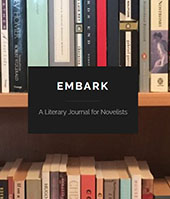New Lit on the Block :: Embark
 Teaching a course in The Novel, I took my students to the fiction section of the library and had them pull down books at random and simply read the first several pages, sometimes just the first sentence. I wanted them to sample as many “beginnings” as they could, then comment on the exercise. Some said they liked it as a way to consider a lot of books and see which one might grab their interest; overwhelmingly, they all wanted to go back and keep reading at least one or more of what they had sampled. Now, imagine this experience of sampling first chapters at your fingertips, on the computer, in one publication, and you will have imagined Embark.
Teaching a course in The Novel, I took my students to the fiction section of the library and had them pull down books at random and simply read the first several pages, sometimes just the first sentence. I wanted them to sample as many “beginnings” as they could, then comment on the exercise. Some said they liked it as a way to consider a lot of books and see which one might grab their interest; overwhelmingly, they all wanted to go back and keep reading at least one or more of what they had sampled. Now, imagine this experience of sampling first chapters at your fingertips, on the computer, in one publication, and you will have imagined Embark.  Teaching a course in The Novel, I took my students to the fiction section of the library and had them pull down books at random and simply read the first several pages, sometimes just the first sentence. I wanted them to sample as many “beginnings” as they could, then comment on the exercise. Some said they liked it as a way to consider a lot of books and see which one might grab their interest; overwhelmingly, they all wanted to go back and keep reading at least one or more of what they had sampled. Now, imagine this experience of sampling first chapters at your fingertips, on the computer, in one publication, and you will have imagined Embark.
Teaching a course in The Novel, I took my students to the fiction section of the library and had them pull down books at random and simply read the first several pages, sometimes just the first sentence. I wanted them to sample as many “beginnings” as they could, then comment on the exercise. Some said they liked it as a way to consider a lot of books and see which one might grab their interest; overwhelmingly, they all wanted to go back and keep reading at least one or more of what they had sampled. Now, imagine this experience of sampling first chapters at your fingertips, on the computer, in one publication, and you will have imagined Embark.
Embark is an open access online quarterly designed specifically for novelists. Founding Editor Ursula DeYoung explains, “It features the openings of unpublished novels, through which people embark on their novel-reading experiences (hence the name!).” Every issue features ten novel openings (the first 2,500-4,000 words of the book), and each opening is accompanied by a brief Author’s Statement (250-500 words).
Before starting Embark, DeYoung worked as a novelist and editor in Cambridge, MA. Her first novel, Shorecliff, was published in 2013 by Little, Brown, and she is currently in the process of selling her second novel. DeYoung’s inspiration for founding Embark came partly from her work as a fiction-writing teacher at the GrubStreet Writing Center in Boston. “I’ve been very impressed by the enthusiasm and talent of my students,” she says, “and I feel that their work, and the work of other striving novelists, deserves promotion.
“I’ve also found very few ways for novelists to publicize their works-in-progress. While short-story writers can choose from a plethora of literary journals when seeking publication, novelists often feel constrained to wait until an entire project is finished and sold to a publisher before receiving any feedback or recognition from the reading public. Yet the openings of novels need especially careful polishing, given that the first pages must hook the reader and set the stage for the entire book. For this reason, I hope that the process of refining a submission to Embark is in itself helpful for writers, and that those writers who are chosen as contributors will both feel encouraged in their projects and receive deserved notice for their novels’ beginnings.”
For readers, DeYoung says Embark ‘s novel beginnings will offer “fascinating and manageable reading experiences that may be tantalizing (they should be, if they are well-crafted!) but are also satisfying in themselves.” As the editor, DeYoung finds it heartening and inspiring to know that there are so many working novelists out there, producing such interesting work. For writers, her hope is that eventually Embark ‘s contributors will find agents and publishers – perhaps in part because of their inclusion in Embark ‘s issues! “In any case,” she says, “I am very pleased to offer a forum in which novelists can publish and promote the beginnings of their works-in-progress.” And as readers, we are fortunate to share in this!
The first issue of Embark includes novel beginnings by Elizabeth Bell, Sean Griffith, Judith Haran, Derek Heckman, Margo Orlando Littell, Bill Mesce, Jeffrey Perso, Jo-Anne Rosen, Marian Szczepanski, and Shannon Connor Winward. Readers will enjoy a broad range of genres, DeYoung writes in the Editor’s Introduction, “from science fiction to surrealism, from the story of a would-be saint to a suspenseful police thriller. The characters are similarly wide-ranging: mothers, teachers, doctors, robbers, an officer on a spaceship, a teenage composer. What unites all ten openings is their power to engage the reader and deliver the unexpected.”
For writers, quarterly deadlines are posted on the publication’s website. Submissions are accepted via e-mail with a response time of two-three months. Embark welcomes submissions from working novelists everywhere!
